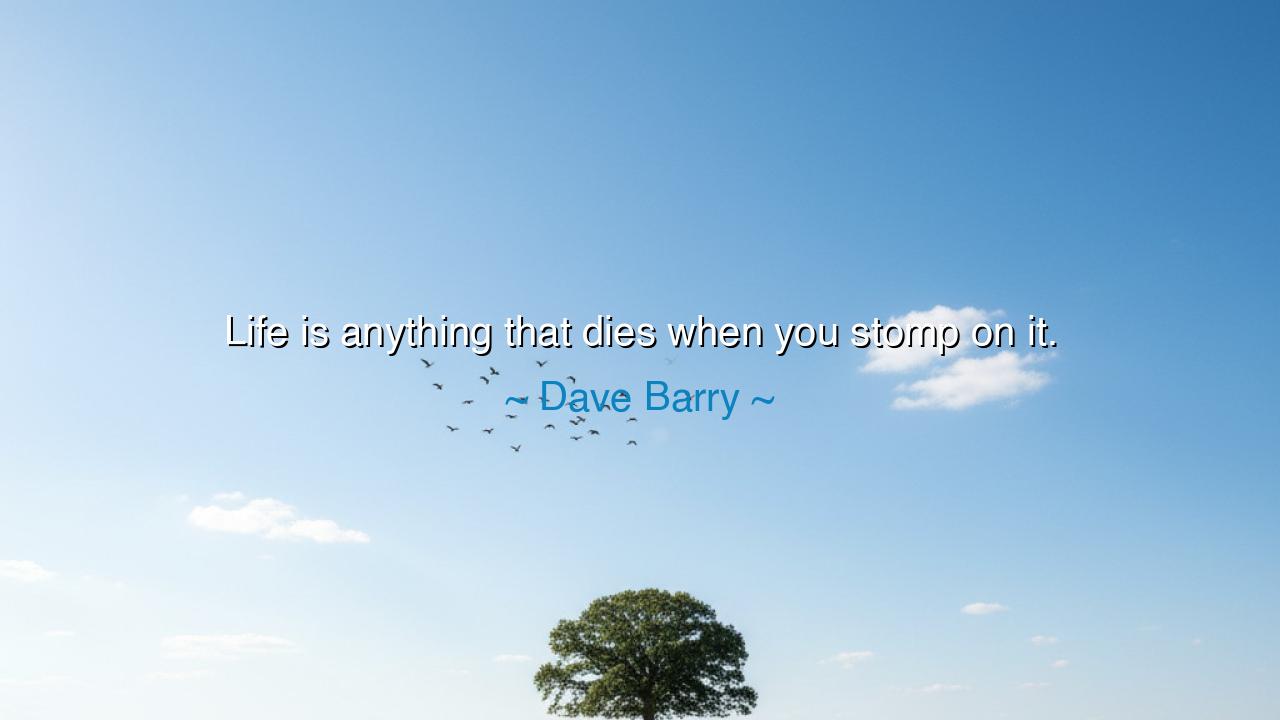
Life is anything that dies when you stomp on it.






“Life is anything that dies when you stomp on it.” – Dave Barry
In the wisdom of ages, beneath the jest of this saying lies a truth as old as the mountains: life is that which responds, feels, and ends. Dave Barry, in his humor, reminds us of a solemn and eternal observation — that to live is to be vulnerable, and that to die is the final proof of having once held the sacred spark. The phrase is simple, almost playful, yet its heart beats with the rhythm of philosophy itself. It calls us to see that life is not in the idea of breathing alone, but in the fragile miracle that ceases when crushed. It whispers that what can die is what truly lives.
Long ago, the Stoics spoke of sympatheia, the thread that connects all living things. To step upon a small creature, to feel it die beneath one’s heel, is to be reminded that life, however small or unseen, holds the same essence as our own. This quote, though modern in tongue, carries the same reverence for being that filled the temples of ancient wisdom. It says: “Respect what can perish, for it mirrors you.” In a world that often forgets to bow before the mystery of existence, these words awaken a gentle sorrow — the sorrow of awareness, the ache of connection.
Consider the tale of Prince Siddhartha, who became the Buddha. Sheltered from suffering, he walked one day beyond the palace gates and saw the dead, the sick, and the old. It was then that he realized what Dave Barry’s words echo in jest — that the measure of life is found not in what it does, but in what it can lose. Life reveals itself most honestly in its frailty. The flower crushed beneath the traveler’s boot, the ant carried away by the wind — these are not just casualties of nature, but sacred testaments that to live is to risk death.
And yet, the lesson is not despair. For if life can die, it can also thrive. The same fragility that makes life fleeting gives it its beauty. The ancients knew this when they carved their gods from stone and still bowed before the living tree. They saw that mortality is the gift that sharpens the soul’s hunger for meaning. What cannot die cannot grow; what cannot end cannot begin. Thus, Barry’s wry observation becomes a hymn to the preciousness of every beating heart, from man to moth.
Think of the farmer who wakes before dawn. Each morning, he tends his fields knowing that frost, drought, or the careless step of his own foot may undo his labor. Yet he does it still, not because life is safe, but because it is sacred. His reverence is quiet but profound — he does not stomp upon what he tends. He moves gently among living things, honoring their temporary grace. So too must we tread softly through our own days, aware that all around us are worlds that can end in an instant.
The lesson is clear: to recognize life is to act with reverence. Do not crush what you do not understand. Do not scorn the small, nor trample the weak, for they carry the same light that burns within you. The next time you see a living creature — even an insect — pause and remember: it too dies when you stomp on it. And in that death, something irreplaceable vanishes. Let that knowing shape your kindness.
In practice, this means living consciously. Walk with care. Speak with compassion. Choose not to harm needlessly — not only with your hands, but with your words and judgments. For every act of gentleness ripples outward, preserving the miracle of life where harshness would end it. The ancients would call this the way of harmony, the path of those who understand that to preserve life, in any form, is to honor the divine breath within all things.
So let these words settle deep within you: Life is anything that dies when you stomp on it. It is not a jest, but a mirror held to the human spirit. In every fleeting pulse of life — fragile, trembling, and temporary — lies the eternal call to walk softly upon the earth, for everything that lives is kin to your own soul.






AAdministratorAdministrator
Welcome, honored guests. Please leave a comment, we will respond soon